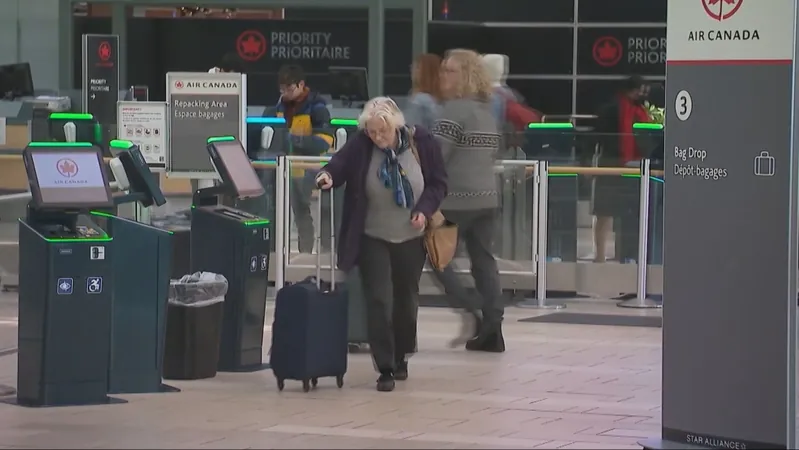
Major Changes Coming to Canada’s Express Entry in 2025 - What You Need to Know!
2025-01-03
Author: Jacques
Introduction
As Canada prepares for significant alterations to its Express Entry system in 2025, prospective immigrants should brace themselves for impactful changes that could alter their paths to residency. These adjustments are set against the backdrop of sweeping reforms initiated in 2024, aiming to streamline immigration processes and align them more closely with Canada’s labor market needs.
Increased Immigration Targets for Express Entry
In 2025, Express Entry is expected to claim a larger slice of Canada's overall immigration targets, with the federal government boosting the Federal Economic Programs target to an impressive 124,590 admissions, up from 110,770 in 2024. This increase comes despite an overall reduction of 20% in immigration levels, indicating a strategic shift towards prioritizing skilled economic immigrants over provincial pathways.
Express Entry, which encompasses the Federal High-Skilled category, is poised to represent a staggering 31.5% of total planned admissions in 2025, showcasing its growing significance in the immigration landscape. With the Provincial Nominee Program (PNP) poised to drop its allocations significantly from 110,000 to 55,000, Express Entry will become a crucial avenue for skilled workers eager to make Canada their new home.
Dramatic Shift: No More CRS Points for Job Offers
One of the most significant changes emerging in 2025 is the announcement by Immigration Minister Marc Miller that Comprehensive Ranking System (CRS) points will no longer be awarded for valid job offers. This means candidates who previously relied on these points—ranging from 50 to 200 based on job offer levels—will need to adjust their strategies significantly.
While this change is labeled temporary, the implications could lead to a decline in CRS scores for many candidates, leaving them to depend more heavily on other factors such as language skills and work experience to improve their rankings. As a result, the competition within the Express Entry pool may intensify as candidates recalibrate their profiles in response to this policy shift.
Emergence of New Sub-Categories: Federal Economic Priorities and In-Canada Focus
In 2025, the Federal High Skilled (FHS) allocation will undergo a transformation, splitting into two new focus areas: Federal Economic Priorities and In-Canada Focus.
- In-Canada Focus: With a target of 82,890 admissions, this category will primarily consider candidates who are already residing in Canada. This includes individuals in the Canadian Experience Class (CEC), Provincial Nominee Programs aligned with Express Entry, as well as skilled workers in federal programs.
- Federal Economic Priorities: Targeting 41,700 candidates, this allocation will emphasize individuals who fulfill Canada’s pressing labor market demands, prioritizing sectors such as healthcare, trades, and candidates proficient in French.
Category-Based Selections: A New Emphasis
As part of its strategy to address labor shortages, the Immigration, Refugees and Citizenship Canada (IRCC) will intensify category-based selections in 2025. Expected priority sectors include:
- Healthcare occupations
- Trades occupations
- French-language proficiency
While previous years saw limited draws for healthcare and trades candidates, the 2025 framework anticipates an increase in invitations directed to these groups in alignment with labor market needs. Additionally, French proficiency remains a critical focus, targeting 8.5% of new immigrant admissions in 2025, with plans to elevate this to 9.5% in 2026.
Conclusion
In conclusion, the impending changes to Canada’s Express Entry system present both challenges and opportunities for aspiring immigrants. As the landscape shifts towards catering to specific labor market requirements, candidates will need to stay informed and agile to improve their chances of securing a coveted spot in Canada’s immigration system. Keep an eye out for these developments as they unfold, as they could significantly shape the future of Canadian immigration!









 Brasil (PT)
Brasil (PT)
 Canada (EN)
Canada (EN)
 Chile (ES)
Chile (ES)
 España (ES)
España (ES)
 France (FR)
France (FR)
 Hong Kong (EN)
Hong Kong (EN)
 Italia (IT)
Italia (IT)
 日本 (JA)
日本 (JA)
 Magyarország (HU)
Magyarország (HU)
 Norge (NO)
Norge (NO)
 Polska (PL)
Polska (PL)
 Schweiz (DE)
Schweiz (DE)
 Singapore (EN)
Singapore (EN)
 Sverige (SV)
Sverige (SV)
 Suomi (FI)
Suomi (FI)
 Türkiye (TR)
Türkiye (TR)